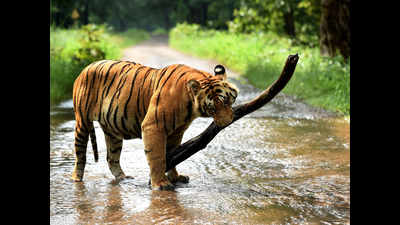- News
- City News
- bengaluru News
- In Karnataka, human-animal conflict claims 45 lives every year
Trending
This story is from January 31, 2019
In Karnataka, human-animal conflict claims 45 lives every year

BENGALURU: Every year, Karnataka is losing around 45 people to human-animal conflicts, i.e. four deaths per month. Even as the forest department launched an operation to track the tiger that allegedly mauled a tribal man to death in Nagarahole Tiger Reserve recently, data accessed by TOI shows the face-off is not limited to only a few districts.
While there is no dip in conflicts despite various measures taken by the forest department, newer areas are becoming prone to such attacks, thanks to depleting forest cover and growing human presence.Of the total 220 human deaths in the last five years, most of them were caused by elephants followed by tigers, bears and leopards.
“Hitherto, the problem was limited to districts like Chamarajanagar, Udupi, Ramanagara, Mandya and Bengaluru Rural districts. Now, the cases are on the rise in Ballari, Chitradurga, Davanagere, Belagavi, Chikkamagaluru and Haveri,” said an official.
“About Rs 10 crore has been distributed as compensation to the families of the dead. Even in 2018-19, the number is expected to touch 45 as we’re yet to receive data from various forest sub-divisions,” he added.
According to wildlife enthusiast Dipak K, habitat loss and fragmentation of wildlife corridor are making things worse. “Western Ghats are being haunted with roads, mini-hydel projects and other development works. Such hurdles push elephants, which have large home ranges, into human habitats. On the other hand, number of wildlife species like leopards is rising. They come in conflict with humans as they go in search of newer habitats,” he added.
Subhash K Malkhede, additional principal chief conservator of forests (wildlife), pointed out more leopards are coming in conflict with humans. “This could be the reason why new districts are getting added to the conflict data. We’ve been creating awareness among people living in forest borders and taking measures to protect animal habitats. In case of human deaths, we’re ensuring speedy disposal of compensation,” he added.
While there is no dip in conflicts despite various measures taken by the forest department, newer areas are becoming prone to such attacks, thanks to depleting forest cover and growing human presence.Of the total 220 human deaths in the last five years, most of them were caused by elephants followed by tigers, bears and leopards.
“Hitherto, the problem was limited to districts like Chamarajanagar, Udupi, Ramanagara, Mandya and Bengaluru Rural districts. Now, the cases are on the rise in Ballari, Chitradurga, Davanagere, Belagavi, Chikkamagaluru and Haveri,” said an official.
“About Rs 10 crore has been distributed as compensation to the families of the dead. Even in 2018-19, the number is expected to touch 45 as we’re yet to receive data from various forest sub-divisions,” he added.
Other forms of losses include permanent injury to people, crop damage and loss of properties.
According to wildlife enthusiast Dipak K, habitat loss and fragmentation of wildlife corridor are making things worse. “Western Ghats are being haunted with roads, mini-hydel projects and other development works. Such hurdles push elephants, which have large home ranges, into human habitats. On the other hand, number of wildlife species like leopards is rising. They come in conflict with humans as they go in search of newer habitats,” he added.
Subhash K Malkhede, additional principal chief conservator of forests (wildlife), pointed out more leopards are coming in conflict with humans. “This could be the reason why new districts are getting added to the conflict data. We’ve been creating awareness among people living in forest borders and taking measures to protect animal habitats. In case of human deaths, we’re ensuring speedy disposal of compensation,” he added.
End of Article
FOLLOW US ON SOCIAL MEDIA










